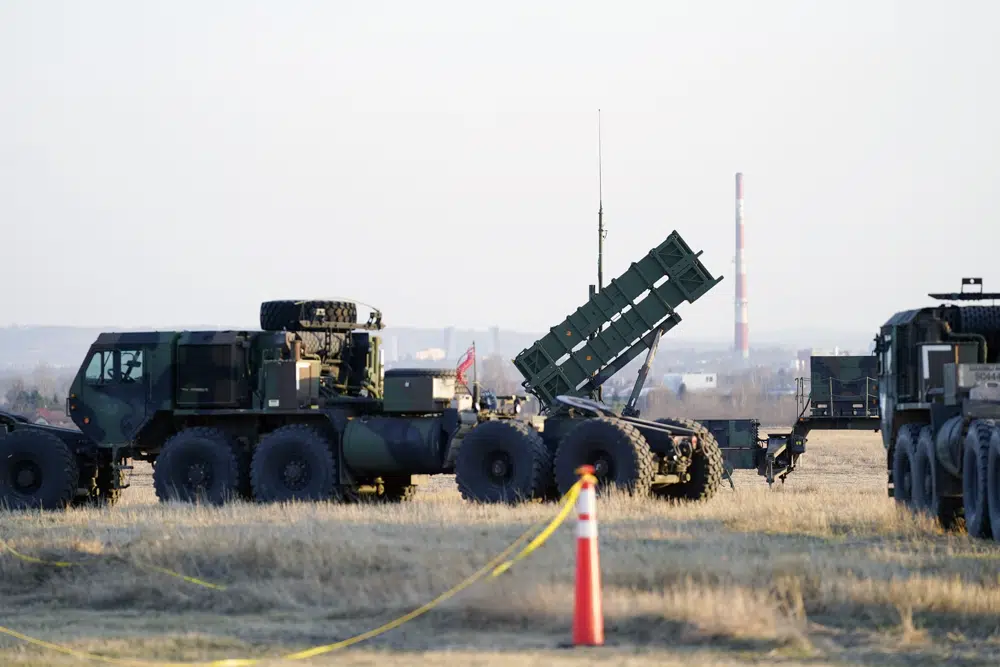The U.S. will send $1.8 billion in military aid to Ukraine in a massive package that will for the first time include a Patriot missile battery and precision guided bombs for their fighter jets, U.S. officials said Tuesday, as the Biden administration prepares to welcome Ukrainian President Volodymyr Zelenskyy to Washington.
U.S. officials described details of the aid on condition of anonymity because it has not yet been announced. The aid signals an expansion by the U.S. in the kinds of advanced weaponry it will send to Ukraine to bolster the country’s air defenses against what has been an increasing barrage of Russian missile strikes.
The package, which was expected to be announced Wednesday, will include about $1 billion in weapons from Pentagon stocks and another $800 million in funding through the Ukraine Security Assistance Initiative, which funds weapons, ammunition, training and other assistance, officials said.
Zelenskyy and other Ukraine officials have pressed Western leaders to provide more advanced weapons, including the Patriots, to help their country in its war with Russia. The Patriot would be the most advanced surface-to-air missile system the West has provided to Ukraine to help repel Russian aerial attacks. The timing of the military aid announcement — as Zelenskyy makes his first trip out of Ukraine since the war began — sends a strong message of continued U.S. support for Ukraine as the war drags on.
The aid comes as Congress is poised to approve another $44.9 billion in assistance for Ukraine as part of a massive spending bill. That would ensure that U.S. support will continue next year and beyond as Republicans take control of the House in January. Some GOP lawmakers have expressed wariness about the assistance.
The decision to send the Patriot battery comes despite threats from Russia’s Foreign Ministry that the delivery of the advanced surface-to-air missile system would be considered a provocative step and that the Patriot and any crews accompanying it would be a legitimate target for Moscow’s military.
It’s not clear exactly when the Patriot would arrive on the front lines in Ukraine, since U.S. troops will have to train Ukrainian forces on how to use the high-tech system. The training could take several weeks, and is expected to be done at the Grafenwoehr training area in Germany. To date, all training of Ukraine forces by the U.S. and the West has taken place in European countries.
Also included in the package will be an undisclosed number of Joint Direct Attack Munitions kits, or JDAMs, officials said. The kits will be used to modify massive bombs by adding tail fins and precision navigation systems so that rather than being simply dropped from a fighter jet onto a target, they can be released and guided to a target.
U.S. fighter and bomber aircraft use the JDAMs, and the Pentagon has been working to modify them so they can be used by Ukraine.
The U.S. so far has been reluctant to provide Ukraine with American fighter jets. Russia has warned the the advanced aircraft would be considered provocative, and the U.S. to date has said other weaponry would be a better fit, citing the significant maintenance and training needs for those warplanes.
So instead of providing Ukraine those U.S. aircraft, the Pentagon is helping Kyiv find innovative ways to upgrade its fleet with the same capabilities it would get with a U.S. fighter jet.
The aid package will also include an undisclosed number of rockets for the High Mobility Artillery Rocket System, thousands of artillery and mortar rounds, trucks, and HARM air-to-surface anti-radiation missiles.
According to officials, the urgent pleadings of Ukrainian leaders and the devastating destruction of the country’s civilian infrastructure, including loss of electricity and heat during winter, ultimately overcame U.S. reservations about supplying the Patriots.
White House and Pentagon leaders have said consistently that providing Ukraine with additional air defenses is a priority, and Patriot missiles have been under consideration for some time. Officials said that as the winter closed in and the Russian bombardment of civilian infrastructure escalated, that consideration took on increased priority.
U.S. officials had balked at providing the Patriots to Ukraine because they could be considered a escalation that would trigger a response from Moscow. In addition, there were concerns about the significant training that would be required and questions about whether U.S. troops would have been required to operate it. President Joe Biden has flatly rejected sending any U.S. combat troops to Ukraine.
One Patriot battery routinely includes up to eight launchers, each of which can hold four missiles. It would be coming from Pentagon training stocks in the U.S..
The entire system, which includes a phased array radar, a control station, computers and generators, typically requires about 90 soldiers to operate and maintain. However, only three soldiers are needed to actually fire it, according to the Army.

